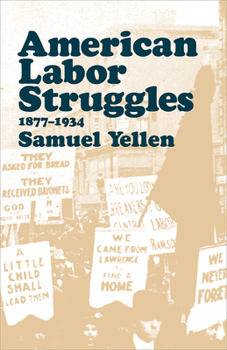American Labor Struggles: 1877-1934
No Synopsis Available.
Format:Paperback
Language:English
ISBN:0873488741
ISBN13:9780873488747
Release Date:October 1998
Publisher:Pathfinder
Length:434 Pages
Weight:0.95 lbs.
Dimensions:0.9" x 5.3" x 8.2"
Customer Reviews
1 rating
New York Times Book Review Feb 23, 1936
Published by Thriftbooks.com User , 19 years ago
New York Times Book Review Feb 23, 1936 pg BR3 Ten Epic Struggles in the History of American Labor Memorable Industrial Battles That Mark the Development of the Labor Organizations of Today Review by Joseph Shaplen This book makes no claim to originality. It is merely a record-but a valuable one-of ten epic struggles in American labor history, from the railroad strikes of 1877 to the general strike in San Francisco in 1934. Mr. Yellen, who from his youth has been intimately associated with labor problems, presents the factual story of these struggles as helping to reveal the development and crystallization of the modern labor movement from a sporadic assertion of militant groups to a mass movement clamoring for recognition as a vital, determining, organic element of American society. Despite the direct, prosale method employed by Mr. Yellen, who is obviously competent to handle the material, the accounts of the memorable industrial battles presented in the book will make a deep impression upon all serious students of the labor movement. And, despite the matter-of-fact presentation, the chapters dealing with the ten big struggles in question are, as Mr. Yellen says, more than chronicles. They are "revealing segments of the entire picture," the picture of the rise of American labor in a society wedded for a long time to rugged individualism, but stirred, nevertheless, in ever-increasing measure be the new collectivist forces born out of the profound economic changes of the past fifty years. The struggles described by Mr. Yellen are confined to basic industries, transportation, steel, coal, and textiles. He analyzes the causes of each conflict, the line of development taken in each instance, and the significance of each to the growth of the labor movement as a whole. Specifically, Mr. Yellen deals with: (1) the railroad uprisings of 1877, which gave great impetus to the growth of labor unions in the country; (2) the Haymarket tragedy and its part in the struggle or the eight hour day; (3) the Homestead lockout and its significance in the efforts, not very successful, to organize the steel industry; (4) the American Railway Union strike of 1894, led by Eugene V. Debs, one of the most dramatic conflicts ever waged by labor in this country; (5) the anthracite strike of 1902; (6) the Lawrence strike of 1912, a brilliant demonstration of labor solidarity; (7) the bitter struggle of the miners in Colorado in 1913; (8) the great steel strike of 1919, the most ambitious effort made to date to organize the steel workers; (9) the Southern textile strikes of 1929 as the prelude to the wider and more significant strike of more recent decade, and (10) the waterfront battle culminating in the generals walkout in San Francisco. As he traces the history of all these conflicts Mr. Yellen discusses the evolution of weapons and methods in industrial warfare used by both capital and labor, the part played by government and social agencies, the id





